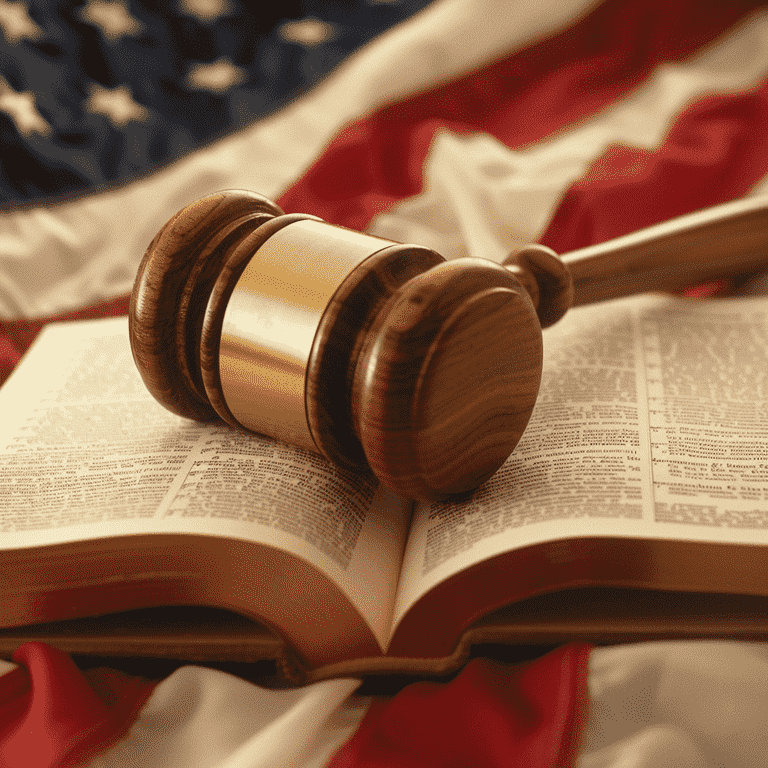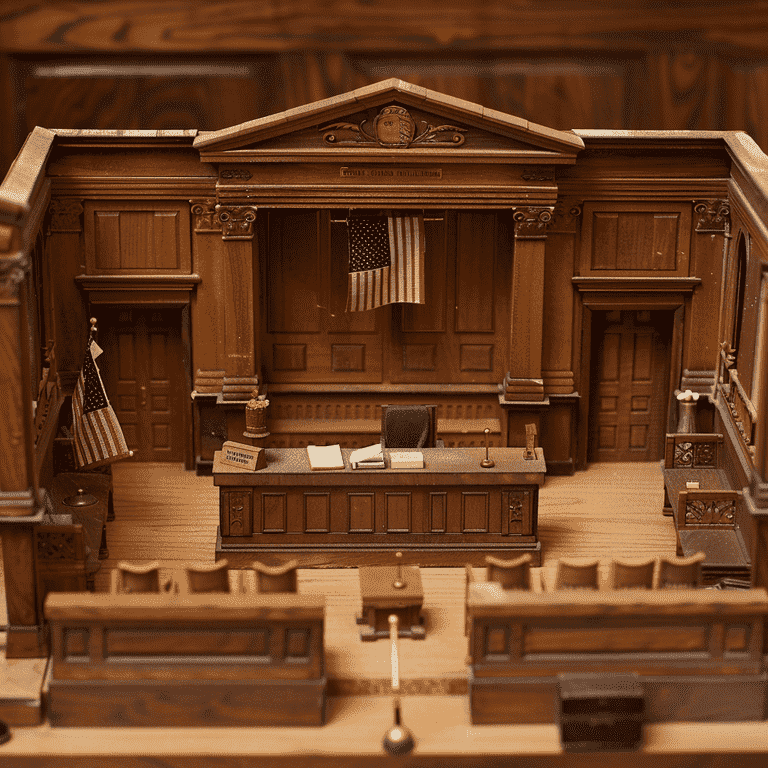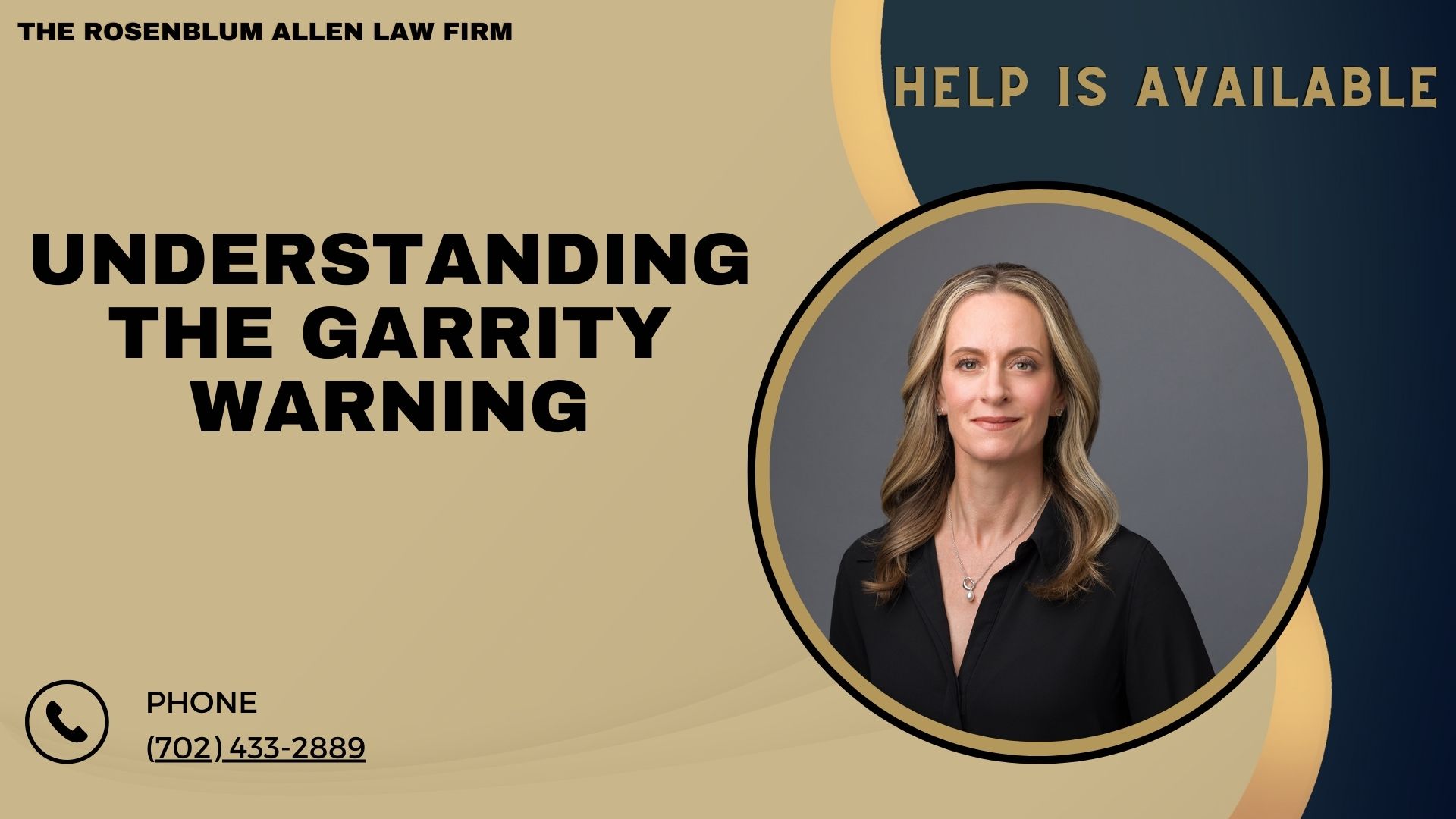The Garrity Warning, named after the landmark 1967 Supreme Court case Garrity v. New Jersey, is a protective warning given to public employees. It ensures that statements made during internal investigations can’t be used against them. This protects their Fifth Amendment right against self-incrimination.
Historical Context and Legal Foundation
The idea of the Garrity Warning emerged from a case. In it, police officers in New Jersey were under investigation. The threat of job loss loomed over them. It was if they refused to testify against themselves in the inquiry. The Supreme Court ruled in their favor. This ruling established the Garrity Warning. It set a precedent for protecting public employees. It shields them from being forced to choose between self-incrimination and their livelihood.
Importance of Garrity Warning in Law Enforcement and Legal Proceedings
The Garrity Warning is critical. It helps balance an employer’s right to investigate with an employee’s constitutional rights. This is especially important in law enforcement. The integrity of officers is paramount. Internal investigations are common.
 The Legal Framework Surrounding Garrity Warning
The Legal Framework Surrounding Garrity Warning
Vital Legal Cases and Decisions
Several critical cases and decisions shape the legal landscape of the Garrity Warning:
The Landmark Garrity v. New Jersey Case: This 1967 Supreme Court case is the cornerstone of the Garrity Warning, setting the initial precedent.
Subsequent Influential Cases and Rulings: Following the Garrity decision, other cases have refined and expanded the understanding and application of the warning, adapting it to new contexts and challenges.
Federal and State Laws Governing the Use of Garrity Warning
The Garrity Warning came from a Supreme Court decision. But, since then, federal and state laws have developed to enforce and regulate it. These laws protect public employees in the US from self-incrimination. They apply during internal investigations.

Garrity Warning Explained
When the Garrity Warning is Issued
The Garrity Warning is issued in certain cases. This is mainly during internal investigations. In these investigations, an employee is asked to make statements. The statements could incriminate them. Key scenarios include:
Internal investigations within law enforcement agencies.
Any situation where a public employee’s statement could lead to criminal charges.
Components of the Garrity Warning
The Garrity Warning typically includes the following components:
Notification of the Investigation: Informing employees that they are part of an internal investigation.
Right to Remain Silent: Advising employees to refuse to answer questions that might incriminate them.
Consequences of Refusing to Testify: Outlining employment-related potential implications of not cooperating.
Protection Against Self-Incrimination: Assuring the employee that their statements cannot be used in criminal proceedings, thus encouraging honest and uninhibited cooperation.
You must understand the Garrity Warning. It is key for navigating internal investigations. This is especially true in the public sector. It is important because it protects people’s rights. It also promotes honesty and accountability in public service.

Rights and Protections Afforded by Garrity Warning
The Garrity Warning isn’t just a formality. It defends the constitutional rights of public employees. Let’s explore how it protects those in the hot seat during internal investigations.
Protection Against Self-Incrimination
The Fifth Amendment and Garrity Warning
Imagine someone asking you a question. Every answer could land you in trouble. That’s the scenario the Fifth Amendment seeks to protect you from. The Garrity Warning extends this shield to the workplace. It ensures employees are not forced to choose between their job and their right to remain silent.
The Scope of Immunity Under Garrity
Use and Derivative Use Immunity
When you speak under the protection of a Garrity Warning, you cloak your words in legal armor. This immunity means that criminal courts cannot use your statements against you. Evidence from those statements is also off-limits.
Limitations and Exceptions
But, it’s not an all-access pass to say anything without consequences. The immunity is specific to criminal prosecution. This means:
Statements can still impact your job status or be used in administrative actions.
If evidence of wrongdoing is found independently of your statements, it can be used against you.

Garrity Warning in Practice
Navigating the Garrity Warning in real-life scenarios requires understanding its application and implications.
The Process of Issuing a Garrity Warning
Steps and Considerations for Law Enforcement Agencies
For agencies, issuing a Garrity Warning is a delicate process. It involves:
They identified the need to recognize situations where employees are asked to provide potentially incriminating statements.
Communicating Clearly: Ensuring the employee understands their rights and the implications of their statements.
Responding to a Garrity Warning
Advice for Employees Facing an Internal Investigation
If you’re on the receiving end of a Garrity Warning, here’s a roadmap to navigate this tricky terrain:
Listen Carefully: Understand the protection it offers and its limits.
Consider Legal Counsel: It’s wise to consult with a lawyer to understand the full implications of your situation.
Weigh Your Options: Remember, while your statements are protected in criminal court, they can still impact your employment.
Legal Strategies and Considerations
For legal professionals, crafting a response to a Garrity Warning involves:
We are evaluating the Case: Understanding the potential risks and benefits of providing statements.
Advising on Rights: Making sure clients fully understand their rights and the implications of their choices.
The Garrity Warning is crucial for public employees. It protects their rights and ensures accountability and integrity in public services. Understanding its details and uses can empower employees and legal professionals. It will help them navigate internal investigations confidently and clearly.

Implications of Garrity Warning for Law Enforcement Officers
The Garrity Warning isn’t just a procedural note. It greatly affects the lives of those who serve and protect. Let’s peel back the layers. We’ll see how they affect police officers’ work and the law.
Professional and Legal Consequences
Law enforcement officers live in a world where their actions are under constant scrutiny. The Garrity Warning is a double-edged sword, offering protection and highlighting accountability. Here’s how:
Impact on Employment and Disciplinary Actions: While criminal charges may be off the table due to Garrity-protected statements, these statements can still lead to job-related consequences, including disciplinary actions or termination, based on policy violations or misconduct.
Navigating the Tightrope: Officers must carefully navigate their responses during internal investigations, balancing honesty with the awareness of potential job implications.
Case Studies and Examples
Real-Life Scenarios: Examining instances where Garrity Warnings were pivotal can shed light on their practical impact. For example, cases where officers’ candid responses under Garrity protection led to significant policy reforms within departments, or conversely, where officers faced administrative actions despite criminal immunity.

Garrity Warning and Public Sector Employees
The Garrity Warning is closely associated with law enforcement. But, it also protects many types of government workers beyond the badge.
Application Beyond Law Enforcement
Broader Public Sector: Teachers, firefighters, city clerks – the Garrity Warning shields all public sector employees from being compelled to incriminate themselves during internal investigations.
Case Examples: Consider a city employee under investigation for misuse of city funds or a teacher facing misconduct allegations. In these scenarios, the Garrity Warning ensures that their statements, made in the context of an employment-related inquiry, can’t be used criminally against them.
Differences in Application and Considerations
The core protection is the same. But, the use of the Garrity Warning can vary based on the specific public sector.
Variability in Policies: Public agencies may have distinct procedures for issuing Garrity Warnings, influenced by state laws and internal policies.
Sector-Specific Implications: The consequences of statements made under Garrity protection can differ significantly across professions, affecting everything from job security to public perception.

Challenges and Controversies Surrounding Garrity Warning
The Garrity Warning straddles a line. It’s between individual rights and organizational integrity. The journey is not without its challenges and controversies.
Legal and Ethical Considerations
Balancing Act: The core challenge lies in balancing employees’ constitutional rights with the necessity for public agencies to investigate and act on misconduct.
Ethical Dilemmas: How does one reconcile the need for transparency and accountability in public service with protecting individual rights against self-incrimination?
Recent Legal Challenges and Developments
Evolving Landscape: The legal framework surrounding the Garrity Warning is far from static. Recent court decisions continue to shape its application, responding to new challenges and societal shifts.
Noteworthy Cases: Highlighting recent legal battles sheds light on the ongoing evolution of the Garrity Warning, illustrating its adaptability to contemporary issues in public employment.
To wrap up, the Garrity Warning is a key link. It connects individual rights and public service integrity. Its implications are important to public sector employees. They show the ongoing dialogue between legal protections. This dialogue involves the demands of accountability and ethical governance.

Breaking It All Down
As we draw the curtains on our comprehensive journey through the intricacies of the Garrity Warning, it’s clear that this legal safeguard is more than just a footnote in law enforcement manuals. It embodies the delicate balance between ensuring accountability within public service and protecting the constitutional rights of public employees.
Summary of Key Points
- The Garrity Warning is a fundamental legal protection that prevents public employees’ statements during internal investigations from being used against them in criminal proceedings.
- Originating from the landmark Garrity v. New Jersey case, it underscores the importance of the Fifth Amendment’s protection against self-incrimination.
- While it offers significant protection, the Garrity Warning has limitations. Statements can still influence employment outcomes and disciplinary actions.
- The application of Garrity extends beyond law enforcement, covering all public sector employees, each facing unique challenges and considerations.
- The legal and ethical landscape surrounding Garrity is dynamic, with ongoing debates and court decisions continually reshaping its contours.
The Significance of Garrity Warning in Protecting Employees’ Rights
The Garrity Warning is a testament to our value of individual rights even within the structured demands of public service. It serves as a critical reminder of our constitutional protections, ensuring that pursuing integrity and accountability in public sectors does not come at the cost of fundamental rights.
Future Outlook on Garrity Warning in Legal and Law Enforcement Arenas
Looking ahead, the Garrity Warning remains a vibrant area of legal discourse and development. As society evolves, so will the challenges and controversies surrounding this vital protection. Legal professionals, law enforcement agencies, and public sector employees must stay informed and adaptable to navigate these waters effectively.

Frequently Asked Questions
What distinguishes the Garrity Warning from the Miranda Rights?
While the Garrity Warning and Miranda Rights protect against self-incrimination, they apply in different contexts. The Garrity Warning is specific to public employees during internal investigations, whereas Miranda Rights are read to individuals upon arrest before police questioning.
Can private sector employees receive a Garrity Warning?
No, the Garrity Warning specifically applies to public-sector employees. Private-sector employees do not receive Garrity protections during internal investigations conducted by their employers.
Is a public employee always entitled to a Garrity Warning during an investigation?
A Garrity warning is required only when an employee is compelled to give a statement that could potentially incriminate them in a criminal matter. If the investigation is purely administrative and not criminal, or if the employee voluntarily provides information, the Garrity warning may not be applicable.
How does an employee invoke Garrity's rights?
Typically, an employee doesn’t need to invoke Garrity rights actively. The investigating agency is responsible for providing the Garrity Warning when necessary. However, employees can assert their right against self-incrimination if they believe their statements might lead to criminal charges and a Garrity Warning has not been issued.
Are there any consequences if an employer fails to issue a Garrity Warning?
If an employer fails to issue a Garrity Warning and uses the employee’s statements in a criminal prosecution, those statements could be deemed inadmissible in court. This does not necessarily affect the outcome of the internal investigation but can impact criminal proceedings.
Can information from a statement given under Garrity protection be used for any purpose?
Statements made under Garrity protection cannot be used in criminal prosecution, but they can be used for administrative purposes, including disciplinary actions against the employee within their employment context.
What happens if evidence of criminal activity is found independently of a Garrity-protected statement?
If evidence of criminal activity is found independently of the employee’s Garrity-protected statement, it can be used in criminal proceedings against the employee. Garrity protection does not cover independently obtained evidence.
Can an employee refuse to answer questions even after issuing a Garrity Warning?
Yes, employees can remain silent after a Garrity Warning is issued. Still, they may face administrative consequences, including potential job termination, for refusing to cooperate with the investigation.
Does the Garrity Warning apply to voluntary statements made outside of an investigation?
No, the Garrity Warning applies specifically to statements made during a compelled interview as part of an internal investigation. Voluntary statements made outside this context do not receive Garrity protection.
How can public employees prepare for situations where a Garrity Warning might be issued?
Public employees can educate themselves about their rights under the Garrity Warning and consult with legal counsel if they anticipate being involved in an internal investigation. Understanding the implications of their statements and knowing when to seek legal advice are crucial steps in preparation.

Additional Resources for You
In addition to the invaluable guidance offered in our comprehensive articles, our lead attorney, Molly Rosenblum Allen, Esq., has created a suite of resources to assist you during challenging times. The Rosenblum Allen Law Firm is dedicated to providing effective legal support across various areas. Whether you’re facing criminal charges, DUI allegations, or any other legal concerns, we have specialized resources ready to help:
Criminal Defense: For those accused of a crime, our Criminal Defense Attorneys are prepared to defend your rights and secure the best possible outcome.
DUI Charges: Facing DUI charges in Las Vegas? Our Las Vegas DUI Lawyer can guide you through the complexities of DUI law to fight for your rights.
Domestic Violence: If you’re dealing with domestic violence charges, our Domestic Violence Lawyer Las Vegas is here to provide compassionate and robust defense.
Drug Possession: Navigating drug possession charges? Our Drug Possession Lawyer can help protect your future.
Sex Crimes: Accusations of sex crimes are serious and demand skilled legal defense. Our Sex Crimes Attorney is experienced in handling these sensitive cases.
Child Protection Services (CPS) Defense: Facing allegations from CPS? Our CPS Defense Attorney is ready to defend and advise you.
Misdemeanors: For misdemeanor charges, our Misdemeanor Lawyer provides the defense strategy you need.
Warrant Defense: Our Las Vegas Warrant Defense Attorney can assist you in resolving outstanding warrants efficiently.
Probation Violations: For probation-related issues, consult our Las Vegas Probation Violation Attorney for effective legal advice.
Theft Crimes: Facing theft charges? Our Theft Crime Defense Lawyer is here to help clear your name.
Kidnapping: If accused of kidnapping, our Kidnapping Lawyers will fight for your rights and freedom.
Juvenile Defense: Our Juvenile Defense Lawyers specialize in defending the rights of young individuals.
Firearms Law: For issues related to firearms law in Las Vegas, our Firearms Lawyer Las Vegas provides dedicated legal support.
Molly Rosenblum Allen, Esq., and The Rosenblum Allen Law Firm are committed to upholding your rights and guiding you through your legal challenges with expertise and compassion.

Outside Resources for You
American Bar Association (ABA): The ABA offers a wealth of resources, including public education, legal resources, and guidance on finding legal assistance across a wide range of legal issues.
National Association of Criminal Defense Lawyers (NACDL): The NACDL advocates for the rights of individuals within the criminal justice system and provides resources for criminal defense attorneys.
National Domestic Violence Hotline: For those facing situations of domestic violence, the National Domestic Violence Hotline offers confidential support and resources.
Substance Abuse and Mental Health Services Administration (SAMHSA): SAMHSA provides critical information and treatment options for substance abuse and mental health issues.
National Coalition Against Domestic Violence (NCADV): The NCADV works to advocate for victims of domestic violence and provides resources for support and empowerment.
Innocence Project: The Innocence Project works to exonerate the wrongly convicted through DNA testing and reforms the criminal justice system to prevent future injustices.
FindLaw: FindLaw offers a comprehensive library of legal information and resources for the public, including guides on a wide range of legal topics.

A Special Message from Our Lead Attorney, Molly Rosenblum Allen, Esq

Dear Reader,
Thank you sincerely for taking the time to explore the resources we’ve shared. We know that legal matters can be scary. Our goal is to give you the support and info you need. It will help you make informed choices about your situation.
Each journey through the legal system is unique. While these resources are a good start, nothing replaces personalized advice. We specialize in many legal issues. They include challenging divorce and criminal charges. Know that my team and I are here to assist with them.
Please reach out to us at (702) 433-2889. We can discuss your situation. We can talk about how we might help move it forward in a positive way.
Looking forward to the opportunity to support you,
Molly Rosenblum Allen, Esq.




